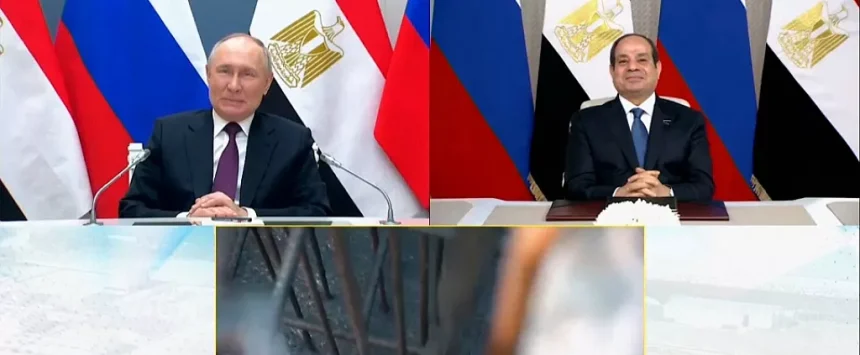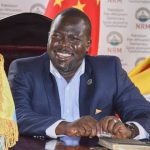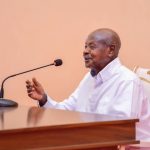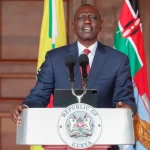Egyptian President Abdel Fattah el-Sissi declared on Tuesday that Egypt and Russia have embarked on what he termed “a new era of collaboration.” His remarks were made during the groundbreaking ceremony for Egypt’s inaugural nuclear plant, the El Dabaa Nuclear Power Plant, a project undertaken in partnership with Russia’s state nuclear energy corporation, Rosatom.
El-Sissi, speaking at the ceremony characterized the El Dabaa project as a significant advancement in the relations between Russia and Egypt. He underscored the global energy challenges and disruptions in the supply chain as motivations for rejuvenating Egypt’s peaceful nuclear program.
“It contributes to the provision of secure, cost-effective and sustainable energy, reducing our reliance on fossil fuels and mitigating price fluctuations,” he emphasized.

Russian President Vladimir Putin participating in the ceremony via video link reiterated his country’s commitment to fostering modern industries and bilateral cooperation.
“We will collaborate to establish modern industries, create skilled jobs and address social challenges. This flagship project epitomizes the best traditions of our bilateral cooperation,” Putin remarked.

Putin also noted his continuous communication with President el-Sissi particularly on matters related to the Palestinian-Israeli conflict. Meanwhile, a senior Egyptian official revealed ongoing efforts with Qatar to develop a comprehensive proposal aimed at bridging gaps and facilitating a resolution to the Israeli-Palestinian conflict.
Putin highlighted additional collaborative initiatives such as the creation of a Russian industrial zone in the Suez Canal area and expressed support for Egypt’s aspiration to become a full member of BRICS.
El-Sissi during the meeting characterized the foundation laying as a “new brilliant chapter” in the close cooperation between Egypt and the Russian Federation.

El Dabaa nuclear power plant location and details
The El Dabaa nuclear power plant site is in close proximity to rail, road and transmission interconnections. It has low regional seismic activity and sufficient cooling water supply.
The plant will consist of four VVER-1200 nuclear reactors of AES-2206 design, which are capable of producing 1.2GW each. The first unit is expected to begin commercial operations in 2026 while commissioning of the remaining three reactors is scheduled for 2029.The VVER-1200 reactor is a third-generation pressurised water reactor that is fully compliant with all international safety and post-Fukushima IAEA requirements. It is designed to withstand the crash of a 400t airplane or earthquakes up to an intensity of 9 on the Richter scale.
The design lifetime of the plant will be 60 years.
Financing of El Dabaa nuclear power plant
Russia will fund approximately 85% of the construction cost of the El Dabaa nuclear power project. It will provide a $25bn loan, under a financing agreement signed between the Ministry of Finance of Egypt and the Ministry of Finance of the Russian Federation. The loan is repayable over a period of 22 years at an interest rate of 3% a year.
The remaining 15% will be raised by Egypt from private investors.
Contractors involved
The Ministry of Electricity and Renewable Energy of Egypt signed an agreement with Russian state-owned company ROSATOM to build, finance and operate the nuclear plant in November 2015. Notices to implement the previously signed contract were signed on December 2017.
The contract also includes a supply of nuclear fuel over the plant’s entire operational life and assistance for the operation and maintenance of the plant for the initial ten years of operation. ROSATOM will also build storage and supply containers for storing spent fuel.
Gowling WLG has acted as the legal adviser in the negotiation of the contracts for the El Dabaa nuclear power plant since November 2015. The contracts included engineering, procurement and construction, spent nuclear fuel, nuclear fuel supply and operations support and maintenance.
The EPC contract was awarded by the NPPA of Egypt to JSC Atomstroyexport in December 2016.
ROSATOM Engineering Division is the general designer and contractor for the project.
Worely, a professional services company based in Australia, provided consultancy services for the project.
Bulgarian engineering company GCR assisted Worely in reviewing licensing and technical documentation including the preliminary and probabilistic safety analysis reports for the project.








